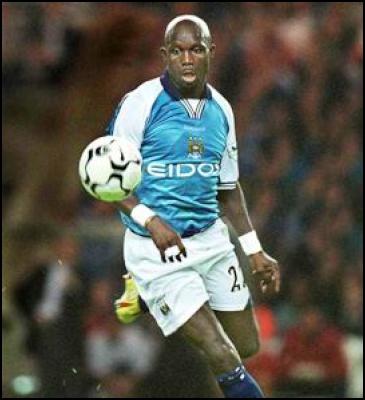George Weah: From Soccer Star to President?
George Weah: From Soccer Star to President?
By Stephen de Tarczynski

George Weah - Soon To
Be President of Liberia?
Liberia’s George Weah was crowned as FIFA’s World Footballer of the Year in 1995, the most prestigious individual award that a soccer player can achieve. Ten years later, Weah is running for President of the small West African nation of Liberia, one of the poorest nations on earth.
The October 11 elections are being contested by a total of 22 candidates. For the winner, a monumental task of rebuilding, reconstruction and reconciliation awaits in this country where civil war has wreaked so much havoc.
Fighting erupted in Liberia in 1989 with the uprising of Charles Taylor’s National Patriotic Front of Liberia (NPFL) and only ended in 2003 after then-President Taylor agreed to step down, accepting exile in Nigeria. More than 200,000 people died, many became refugees and the country was left in economic ruin and overrun with weapons.
William Reno, from Northwestern University’s Program of African Studies in Chicago, sees the importance of the elections. “Politically they’re important because it’s a step in the post-conflict transition, so that for the first time the country has a government that’s actually been chosen by the ballot-box rather than imposed,” he says
Liberia’s history is strongly connected to the United States. Beginning in 1816, the American Colonisation Society transported freed slaves who wished to be returned to Africa. More than 20,000 were resettled, 75% of which came from the USA. These settlers declared the Republic of Liberia in 1847.
Born in 1966 in the Monrovia slum of Santa Clara, George Weah’s prodigious football talents took him from Liberia to Cameroon, and then to Europe where he played for clubs such as AC Milan, Chelsea and Manchester City. Along with being named World Footballer of the Year, Weah was also European Footballer of the Year in 1995 and was named African Player of the Century in 2000.
Despite being a highly-paid professional footballer, Weah continued to play for Liberia’s national team, the Lone Star, throughout his career. At times Weah bankrolled the team, purchasing uniforms, paying coaches fees and even buying airplane tickets.
William Reno expects Weah, 39, to win the election as candidate for the Congress for Democratic Change. “He’ll win,” predicts Reno. “He’s got name recognition, that’s for sure,” he says, referring to Weah’s huge popularity, especially among the younger generations.
That popularity is enhanced by factors other than football. Weah became a UNICEF Goodwill Ambassador in 1997 and has supported HIV/AIDS and educational programs in Liberia and elsewhere.
According to William Reno, the fact that Weah spent most of his time outside the country during the civil war is an advantage. He was not part of the political elite of that time, “and people in the country are really cynical sometimes about their political elite,” says Mr Reno.
“So here comes this guy [Weah], he’s made his way in the world; he’s made his fortune by doing something different. He did something that tons and tons of people aspire to, so he’s a role model. He goes away, gets rich, but then he comes back,” says Mr Reno. “That’s the surprising thing.”
For all of Weah’s appeal, Reno sees his weaknesses too.
“The guy hasn’t had experience actually running a government,” says Mr Reno. “He talks about providing social services and he’s supposedly somebody who’s more appealing to younger people. But if you’ve got somebody who’s twenty years old, who’s voting for the first time and maybe has fought in the war, had their life disrupted by the war, then I think that Weah’s plan to introduce all these social services and schools and things, the reality is that it’s not going to happen right away,” argues Mr Reno.
Mr Reno views Ellen Johnson-Sirleaf of the Unity Part as one of Weah’s main rivals for the Presidency. “I think if people made a more pragmatic choice then I would say that by conventional standards, probably Ellen Johnson-Sirleaf has the most qualifications. She’s actually run things,” says Mr Reno.
Whatever the outcome of the elections, the victorious party will instantly have a huge job to do. With a population of 3.6 million, life expectancy within the country is 47.7 years. 80% of the population live below the poverty line.
William Reno cautions that the elections are just one step within the main problem of re-establishing government administration. “The election is only part of the process,” he says. “The other part is this really difficult business of how you have a UN intervention [referring to the United Nations Mission in Liberia (UNMIL)] and then have Liberians take over all of these government services and actually sustain that.” Reno thinks that it will be decades before Liberia can stand on its own two feet.
In the meantime, George Weah may be about to play in the hardest game of his life.
ENDS


 Binoy Kampmark: Condemning The Right To Self-Defence - Iran’s Retaliation And Israel’s Privilege
Binoy Kampmark: Condemning The Right To Self-Defence - Iran’s Retaliation And Israel’s Privilege Gordon Campbell: On The Making Of King Donald
Gordon Campbell: On The Making Of King Donald Binoy Kampmark: Rogue States And Thought Crimes - Israel Strikes Iran
Binoy Kampmark: Rogue States And Thought Crimes - Israel Strikes Iran Eugene Doyle: The West’s War On Iran
Eugene Doyle: The West’s War On Iran Richard S. Ehrlich: Deadly Border Feud Between Thailand & Cambodia
Richard S. Ehrlich: Deadly Border Feud Between Thailand & Cambodia Gordon Campbell: On Free Speech And Anti-Semitism
Gordon Campbell: On Free Speech And Anti-Semitism